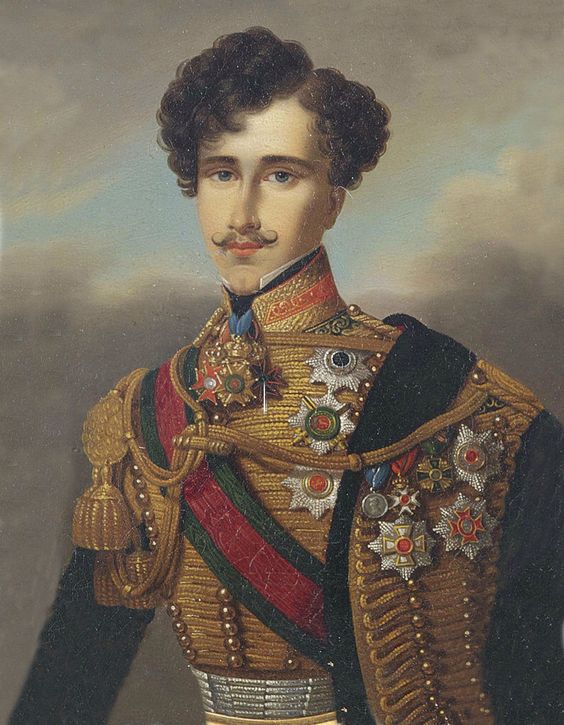by Scott Mehl © Unofficial Royalty 2018
Duchy of Brunswick: The Principality of Brunswick-Wolfenbüttel was a subdivision of the Duchy of Brunswick-Lüneburg. After the dissolution of the Holy Roman Empire, the Congress of Vienna turned Brunswick-Wolfenbüttel into an independent country called the Duchy of Brunswick in 1815. Ernst August III, the last Duke of Brunswick was forced to abdicate on November 8, 1918, as the German Empire came to an end. Today the land that encompassed the Duchy of Brunswick is in the German state of Lower Saxony.
********************

Karl II, Duke of Brunswick; Credit – Wikipedia
Karl II, Duke of Brunswick, was born in Brunswick, Principality of Brunswick-Wolfenbüttel, now in Lower Saxony, Germany, on October 30, 1804, to Friedrich Wilhelm, Duke of Brunswick-Wolfenbüttel and Princess Marie of Baden. Through his father, he was a great-great-grandson of King George II of Great Britain. Karl had one younger brother:
- Wilhelm, Duke of Brunswick (1806-1884)
After his mother died in 1808, Karl and his brother were sent to live with his maternal grandmother, the former Amalie of Hesse-Darmstadt, while their father raised forces to fight alongside the Austrians against Napoleon. The following year, their father escaped to England and sent for his sons to join him.

The Prince Regent, painting in 1816. source: Wikipedia
In 1815, the Duchy of Brunswick was established by the Congress of Vienna. That same year, on June 16, 1815, Karl’s father died in battle, and Karl became the reigning Duke of Brunswick. He and his brother were placed under the guardianship of their father’s first cousin (and their uncle by marriage), The Prince Regent of Great Britain, the future King George IV of the United Kingdom and King of Hanover. The Prince Regent also reigned in Brunswick on Karl’s behalf. When Karl turned 18 in 1822, he claimed his majority, but the Prince Regent claimed that he would not reach his majority until turning 21. A compromise was reached, and Karl took control of the government on his 19th birthday in 1823. Four years later, Karl tried to invalidate several of the laws established during his minority. This caused great conflict with Hanover, and the German Confederation stepped in, ordering Karl to accept the laws.
In 1830, Karl was in Paris when the July Revolution broke out. He fled the city and returned to Brunswick, announcing that he intended to squash any revolutionary actions by force. This further caused dislike by the people of Brunswick. After being attacked while returning from the theater one evening, and a large mob attempting to storm the palace the next day, Karl fled Brunswick on September 7, 1830. Three days later, his brother Wilhelm arrived in Brunswick and was greeted with large crowds of supporters. A year later, by family law of the House of Guelph, Karl was deemed to have ended his reign on September 9, 1830.
Karl made several attempts to return and regain the throne, but all were unsuccessful. He spent the next 40 years living in London and Paris. The subject of many allegations of impropriety, homosexuality, and other eccentricities, Karl sued several publishers for libel. In 1849, he sued a publisher for republishing a libelous article from years earlier. This case established a precedent in English defamation law, ruling that plaintiffs could sue again if the original libel was re-published. This ruling remained intact until The Defamation Act of 2013.

The Brunswick Monument. photo: By Tommes – Own work, CC BY-SA 4.0, https://commons.wikimedia.org/w/index.php?curid=44155891
When the Franco-Prussian War began in 1870, Karl was forced to leave Paris and settled at the Beau-Rivage Hotel in Geneva, Switzerland, where he died on August 19, 1873. As he never married and had no direct heirs, Karl left his entire estate to the City of Geneva, on the condition that they built a large tomb for him in a prominent location in the city. The Brunswick Monument was built, largely to Karl’s specific design, in the Garden of the Alps in Geneva, and the Duke’s remains were interred there in 1879.
This article is the intellectual property of Unofficial Royalty and is NOT TO BE COPIED, EDITED, OR POSTED IN ANY FORM ON ANOTHER WEBSITE under any circumstances. It is permissible to use a link that directs to Unofficial Royalty.
Brunswick Resources at Unofficial Royalty
